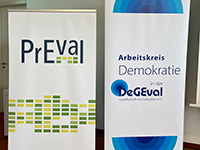
How can Promoting Democracy be Measured?
Spring Meeting of the “AK Demokratie” offered space for fruitful exchange on PrEval topics
This year’s spring meeting of the “AK Demokratie” of the “DeGEval – Evaluation Society” on May 9 and 10 focused on questions of impact measurement. Specifically, it was about the field of promoting democracy, which is also a core topic of the PrEval project. While on the first day fundamental aspects, questions and challenges around the topic were discussed in the field in the context of a panel discussion and a World Café, the second day of the event was mainly dedicated to PrEval.
Both the project presentation by project coordinator Julian Junk (PRIF) and the subsequent workshops on core topics and issues of the project gave participants the opportunity for discussion, exchange and networking. About 60 participants from the fields of evaluation organizations, academia, civil society and representatives of the responsible federal ministries were present in Berlin. Nothing stood in the way of the interactive exchange that the conference organizers had set as their goal.
Four workshops – many perspectives
On the one hand, the PrEval team presented its own work and objectives, but also gave the opportunity to discuss them critically and from multiple perspectives within the framework of four workshops, as well as to try out approaches and instruments that had already been developed. The workshops touched on different aspects of evaluation and impact measurement and complemented the theoretical exchange of the first day, which had highlighted the difficulties in operationalizing concepts such as “sensitization”, “tolerance of ambiguity” or “ability to compromise” and emphasized the need for target group-differentiated approaches. The workshops picked up here, among other things, by considering the international transferability of these concepts, but also by discussing concrete evaluation methods or support structures in evaluation.
For example, the workshop organized by Lucy Huschle and Marcus Kindlinger (both University of Duisburg-Essen; UDE) focused on the challenges of measuring digital citizenship literacy and provided an opportunity to test initial operationalizations. The workshop thus directly linked to one of the pilot studies that is being developed within the framework of PrEval and is coordinated by the UDE.
Under the title “Evaluation knowledge for all?”, Lotta Rahlf (PRIF)
(PRIF) and Simon Müller (DeZIM) asked about opportunities and challenges of possible approaches to evaluation reports. Among other things, they discussed possibilities for a database of evaluation reports – a topic that is also the focus of the “Zukunftswerkstatt” on Evaluation Databases, a sub-project under the joint leadership of DeZIM, DFK and PRIF.
International experiences also played a role: Melissa Li and Sophie Ebbecke (both GPPi) discussed with the participants of their workshop how mutual learning from good evaluation practice in promoting democracy can be strengthened. The main focus was on how international experiences and best practices can be profitably transferred to German evaluation practice. The workshop thus tied in with the objectives of the PrEval sub-project “International Monitoring”, which is coordinated by the GPPi.
The last of the four PrEval workshops focused on methods. Juliane Kanitz (i-unito) tested and reflected on innovative and creative methods such as role play with the participants in order to test their potential as evaluation instruments. The focus was on multiprofessional forms of cooperation and was based on a current PrEval pilot study led by i-unito, which is dedicated to evaluation in security-relevant cooperation contexts.
Exchange, diverse needs and experiences as a basis for further project work
However, the workshops did not only offer insights into the project work and its central questions. They also provided an opportunity for joint reflection and critical discussion.
The results of the discussions and the specific needs that were identified during the workshops are now being incorporated into further project work. On this basis, support formats can be developed that are as target group- and needs-oriented as possible. The same applies to the use of specific evaluation tools and methods: Here, too, the diversity of perspectives and experiences helped to identify starting points for further development in the project. The exchange between different groups of actors once again proved to be fruitful and essential for the topics and challenges worked on by PrEval.
This year’s Spring Meeting was organized by the German Centre for Integration and Migration Research (DeZIM), which coordinates the “Zukunftswerkstatt” on Evaluation Research in the PrEval project and is part of the team of speakers of the “AK Demokratie”.
About the “AK Demokratie”
The Working Group on Democracy (“Arbeitskreis/AK Demokratie”) in the “DeGEval – Evaluation Society” sees itself as a forum for the exchange of actors in evaluation research who focus on the fields of action and topics of promoting democracy. The AK is therefore aimed at persons and members of organizations involved in evaluations/scientific monitoring in the field of promoting democracy. The working group is interdisciplinary and seeks exchange with other DeGEval working groups, especially those that cover different fields of activity. In addition, the working group regularly organizes Spring Meetings in cooperation with other actors.